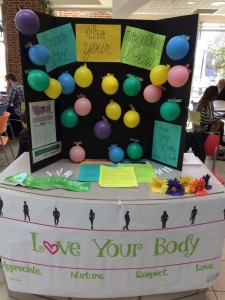“Eating disorders — such as anorexia, bulimia, and binge eating – include extreme emotions, attitudes and behaviors surrounding weight and food issues. They are serious emotional and physical problems that can have life-threatening consequences for females and males. In the United States, 20 million women and 10 million men suffer from a clinically significant eating disorder at some time in their life” (NEDA, 2016)
Are you interested in learning more about eating disorders? Visit the websites below. You’ll also learn about how you can foster a body positive environment.
- nationaleatingdisorders.org
- eatright.org
- feast-ed.org
- eatingdisorderhope.com
- womenshealth.gov/body–image
Are you or someone you know struggling? A team at Penn State’s University Health Services (UHS) and Counseling and Psychological Services (CAPS) can help. The staff are dedicated to working with and helping students who are battling eating disorders. Use the contact information below to call for an appointment.
Healthy Eating and Living Support (HEALS)
University Health Services (UHS) Medical Appointments 863-0774
UHS Nutrition Clinic 863-0461
Counseling and Psychological Services (CAPS) 863-0395

